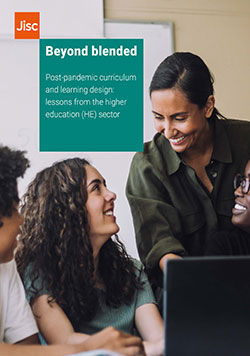Beyond blended
This report follows the second phase of research into curriculum and learning design in higher education (HE) in the UK, which was conducted between November 2022 and July 2023.

The overarching purpose of this research is to support people involved in curriculum and learning design in HE institutions including, service and department leaders, senior managers, learning designers and curriculum teams. The research has involved a desk review, practice review, interviews, and feedback from workshops involving over 700 participants in total. It has learned from the collective experience of the sector during and after the pandemic, including from our 2022 digital experience insight surveys, and has benefited hugely from the input of an advisory group of 21 experts from across UK HE.
This report contains:
- Challenges and transformations in learning and teaching
- Definitions of blended learning
- Four aspects of learning ‘beyond blended’: time, pace and timing, space and place, learning materials - print, digital and other media, and, groups, roles and relationships
- Four modes of participation in learning that shape every session, activity and interaction
- Key decision points for curriculum teams and teachers
- Six pillars for designing ‘beyond blended’ with actions for curriculum design and for strategic planning
- Designs for active student engagement
- Links between the ‘beyond blended’ approach and existing design frameworks
- Potential benefits of using ‘beyond blended’ in your institution
Supporting resources from the report are available below.
Key findings
- All learning is now potentially blended
- Digital technologies are now thoroughly embedded into learning and teaching as a matter of deliberate investment and policy from HE providers
- New pressures such as the climate and economic crises and the surge of interest in generative AI are adding to an already complicated picture for curriculum design
- Unless there is effective support for new approaches, and realistic workload modelling (both for teaching staff and for students), the risk is that online and blended learning will remain associated with the negative experiences of the pandemic and useful learning will not be consolidated
- Contact hours, workload models, timetabling, allocation of spaces and facilities all constrain curriculum design
- Support to develop relevant activities for different modes of participation is required to ensure student engagement and to support inclusion and diversity
What HE providers are saying about ‘Beyond blended’
“The pillars and lenses devised by Jisc provide a framework in which to base our day-today conversations with academic staff and our students through to bespoke learning design interventions. Curriculum design is complex and needs to ensure that a myriad of approaches and considerations are made; the pillars and lenses encourage and facilitate this thinking by ensuring that all the relevant concepts are explicitly considered within an institutions design framework. This approach developed by Jisc will certainly be utilised by the University of Northampton to further enhance our curriculum design expertise.”
Kate Coulson, head of teaching and learning enhancement, University of Northampton
"As we emerge from the pandemic, both students and educators are struggling to navigate their way through a world that presents a bewildering number of possibilities for how to learn. The Jisc Beyond blended report cuts its way through our bewilderment by providing six pillars for curriculum design, together with prompts to frame our thinking. Some of these prompts will help to inform decisions about how and where to deploy resources which will be useful to strategic planning in universities. Others will help educators to engage with students in designing meaningful learning activities that employ technologies that enhance the student experience. The Beyond blended report builds on a wealth of input that will help us to take a mature approach to learning in the 21st century."
Professor Katharine Reid, faculty of science associate pro-vice chancellor for education and student experience, University of Nottingham
“The Jisc ‘beyond blended’ project and associated report is a comprehensive analysis of the current state of play in a post-pandemic higher education sector. It sets out a practical and considered approach to developing blended learning activity within a University setting underpinned by a detailed approach to research and analysis. Even though every institution will take forward ‘blended’ slightly differently, this report acts as a robust starting point for localisation and draws upon experts and knowledge from across the sector to set out a strong foundation and is a ‘must read’ for anyone in a role supporting or leading a more strategic approach to blended learning.”
Professor Simon Thomson, director of flexible learning, University of Manchester
Read the full report
pdf, 10.6 MB, 39 pages
Supporting resources
- Comparing in place and online learning sessions (pdf)
- Comparing live and asynchronous learning time (pdf)
- Exploring the four aspects of designing beyond blended learning (pdf)
- Four modes of participation in learning (pdf)
- Learning activity design from Jisc (2018) (pdf)
- Post-pandemic curriculum design: a summary (pdf)
- Session types in the four modes of participation (examples) (pdf)
- Six pillars for designing ‘beyond blended’ learning (pdf)
- The six pillars as prompts for curriculum design and strategic thinking (pdf)
Find out more
- Sign up to hear when our beyond blended guide is live
- Listen to Helen and Sheila on our Beyond the Technology podcast discussing post-pandemic curriculum and learning design
- Read our phase one report: Approaches to curriculum and learning design across UK higher education
About the authors

